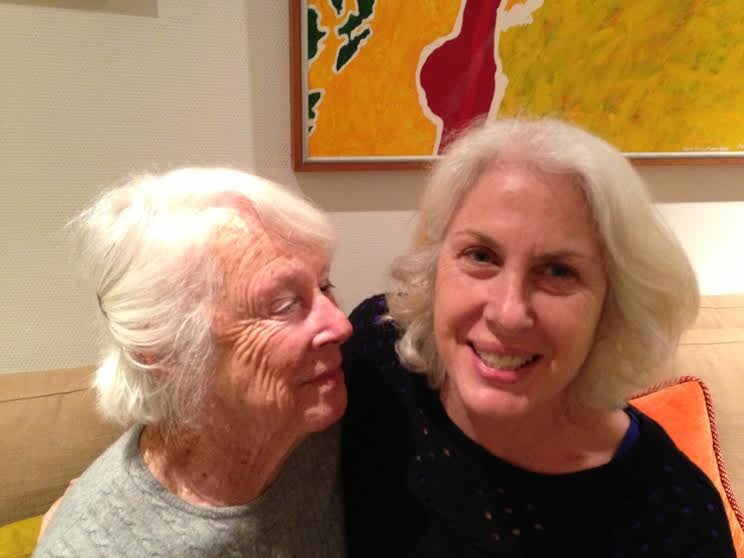Someone once told me: "I've always been vegetarian, because my parents are vegetarians." And maybe you're religious because your parents are; you're an actor, doctor, musician, because your parents are?
We are brought up by our parents, the majority of whom want the best for us. That is, what they think is best for us; but their preferred journey for us may not necessarily be our path. Whether we follow their footsteps or create our own destiny depends on many factors.
We learn to experience and see our life through our parents' eyes first. As children, we rely on them to teach us what is safe and unsafe.
Later on, we all gather our own hard-earned wisdom largely by learning from our own mistakes. All our experiences cluster together to make a bank of knowledge and - driven by love - we are eager to pass this onto our own children one day. It can be very frustrating for parents to have their knowledge and well-meaning advice refused, or worse laughed at or ignored!
Our parents are only human
In order to understand where our parents are coming from or why they behave as they do, we need to try to understand and know them better.
The more understanding you have of them as humans, the more you mature as an adult and the more responsibility you learn to take, the more the blame starts to diminish.
We all make mistakes. It's a human thing. We tend to protect ourselves by trying to make sense out of things and build a wall so we don't get hurt again. There is nothing wrong with that, but seeing things as black-and-white or all-or-nothing can be damaging for our relationships.
As our parents are only human, they come with their own complex and varied life stories, all of which will affect how they are able to be with you and communicate with you.
Intergenerational trauma
In therapy clients often reflect on their childhood, but they also often talk about their parents' upbringing and the experiences of their parents' childhoods, which would have shaped them into the people they are today.
This is especially true when we think about trauma. Thanks to the study of epigenetics, we know now how trauma can be passed down the generations. Populations subjected to long-term mass trauma, colonialism, slavery, war and genocide exhibit a higher prevalence of disease even several generations after the original trauma occurred.
And how do you think this affects our mental health? Our ability to accept and move on? Receive information and think outside of the box? Transgenerational trauma can have a significant effect on individuals and their family system.
Children of trauma survivors must be willing to work through their family's trauma in order to break the cycle. We call them a cycle breakers. A cycle breaker is someone who recognises harmful or dysfunctional traits that exist in the culture of their family and decides to trade them for something different, healthier. Unfortunately, this is most likely going to trigger a negative response in other family members.
The difficult part: communication
How often have you tried to communicate something, only to be made to feel like a small child again? Or tried to talk only to be met with a blank look as if you were talking a different language?
Ideally, you would feel able to express your feelings and emotions, but not all of us learned how to. And it's not exactly easy! Maybe we tried in the past, only to feel no one listens or cares.
It takes time and a lot of patience to show people you're just communicating your valid feelings. It takes time for the other side to receive, without reacting and become defensive.
When you're trying to communicate something with a person who is highly reactive it can often ignite a small flame and before you know it there is a bonfire or an argument .
If you can, try and understand what makes the other person react the way they do, instead of taking it personally. Observe the things that add to a fire and what helps to extinguish it. When you sense things have moved into a reactive territory, try to take a step back. It's not going the direction you wanted, you need to take step or two back. Then keep trying.
There are a lot of reasons that parents might become reactive or defensive. You need to look at your parent as a whole complex being who is filtering everything you say through their own frame of reference, biases and preconceived ideas.
Parents will often encourage familiarity in the child and fear the unfamiliar. It may not always be the healthiest choice in favour of our personal growth. A parent may encourage and support their own personality traits in their child: "My son Jimmy is very shy, he's just like me!" This is the part of themselves they have accepted as part of their identity.
But what we really want from our parents is for them to recognise us as adults, with all the complexities and autonomy that that entails. If we never communicate these other parts, then things will carry on as they always have. It is important to break this cycle for your own personal growth.
It will get noticed. What isn't going to get noticed is if we pretend to still be the person they desire us to be instead of showing them the real fully functioning, complex, ever-growing and changing human being.
Preparation and expectations
So, before you approach a parent with something you'd like to communicate, try to ask yourself a few questions:
- Is this something that is affecting your current relationship with them?
- Do you currently feel any resentment/guilt toward your parents?
- Is the urge to please them all the time stopping you communicating?
- Do you feel that by saying how you feel, they might view you differently weak, bad, not good enough ?
- Are you ready to view the situation through their own eyes, walk in their shoes? Or is anger or other emotion clouding your empathy?
- What are your expectations of this conversation? Are you prepared to be vulnerable, misunderstood or not heard again? Will you blame and punish yourself if it doesn't go as planned? Be clear and honest to yourself about your expectations.
What do you want?
This is simple. You want to be loved and you want to belong. But belonging is not just about getting along with others. True belonging is about the courage to stand alone.
A deeper sense of belonging and connection actually gives you more freedom to express your individuality without the fear of jeopardising your belonging.
True belonging doesn't require to change who you are, it requires us to be who we are and be accepted. If people don't know who we really are, what and how we think, there's no true belonging.
We feel a sense of belonging the most when we are able to share our most authentic self with others. When we sacrifice who we are in order to fit in, we feel disconnected from others, but also from ourselves.
‘Fitting in’ is being somewhere you want to be, but they don't really care if you're there or not. Belonging is somewhere you want to be, and they want you. Not belonging at home hits much harder and has a huge impact on your self-worth.
Now, no relationship is going to work if it's one-sided. For the family relationship to work we need one important ingredient. Love. It's that simple.
In therapy it's acceptance. Counsellors do this all the time; they see you, accepting you as you are, using empathic understanding, unconditional positive regard and no judgements.
We can get as close as possible to being able to walk in your shoes and see things through your eyes by actively listening and, with your willingness, opening the old wounds so they can heal. Especially if they affect your present life.







